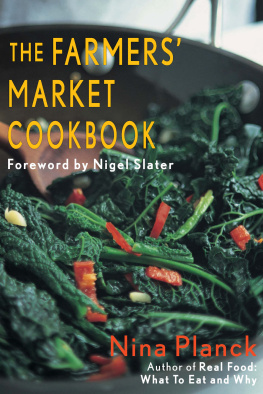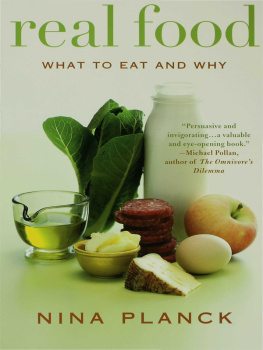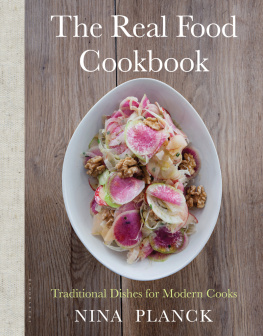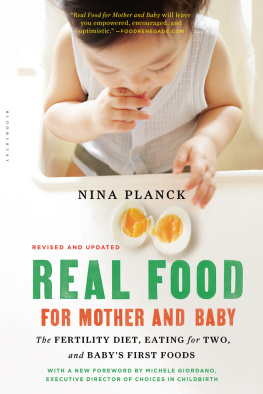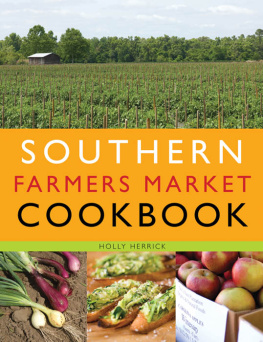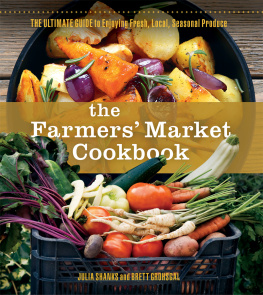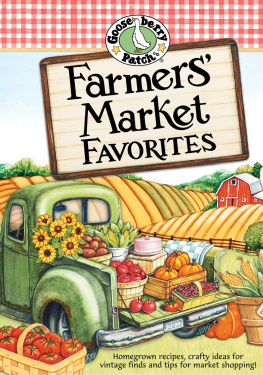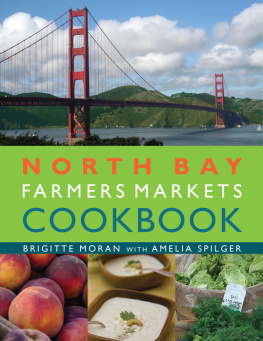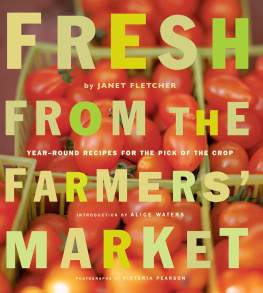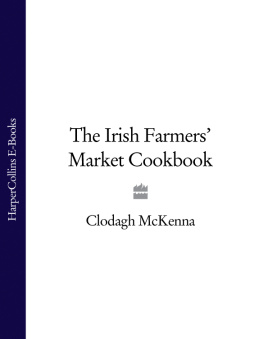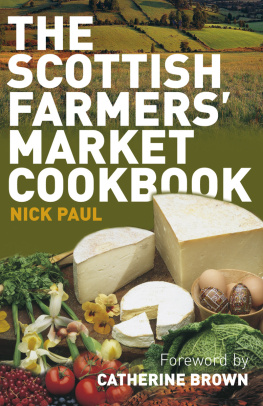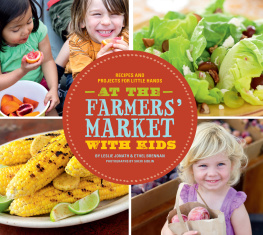Nina Planck - The Farmers Market Cookbook
Here you can read online Nina Planck - The Farmers Market Cookbook full text of the book (entire story) in english for free. Download pdf and epub, get meaning, cover and reviews about this ebook. year: 2001, publisher: Hodder & Stoughton Ltd, genre: Home and family. Description of the work, (preface) as well as reviews are available. Best literature library LitArk.com created for fans of good reading and offers a wide selection of genres:
Romance novel
Science fiction
Adventure
Detective
Science
History
Home and family
Prose
Art
Politics
Computer
Non-fiction
Religion
Business
Children
Humor
Choose a favorite category and find really read worthwhile books. Enjoy immersion in the world of imagination, feel the emotions of the characters or learn something new for yourself, make an fascinating discovery.
- Book:The Farmers Market Cookbook
- Author:
- Publisher:Hodder & Stoughton Ltd
- Genre:
- Year:2001
- Rating:5 / 5
- Favourites:Add to favourites
- Your mark:
- 100
- 1
- 2
- 3
- 4
- 5
The Farmers Market Cookbook: summary, description and annotation
We offer to read an annotation, description, summary or preface (depends on what the author of the book "The Farmers Market Cookbook" wrote himself). If you haven't found the necessary information about the book — write in the comments, we will try to find it.
The Farmers Market Cookbook — read online for free the complete book (whole text) full work
Below is the text of the book, divided by pages. System saving the place of the last page read, allows you to conveniently read the book "The Farmers Market Cookbook" online for free, without having to search again every time where you left off. Put a bookmark, and you can go to the page where you finished reading at any time.
Font size:
Interval:
Bookmark:
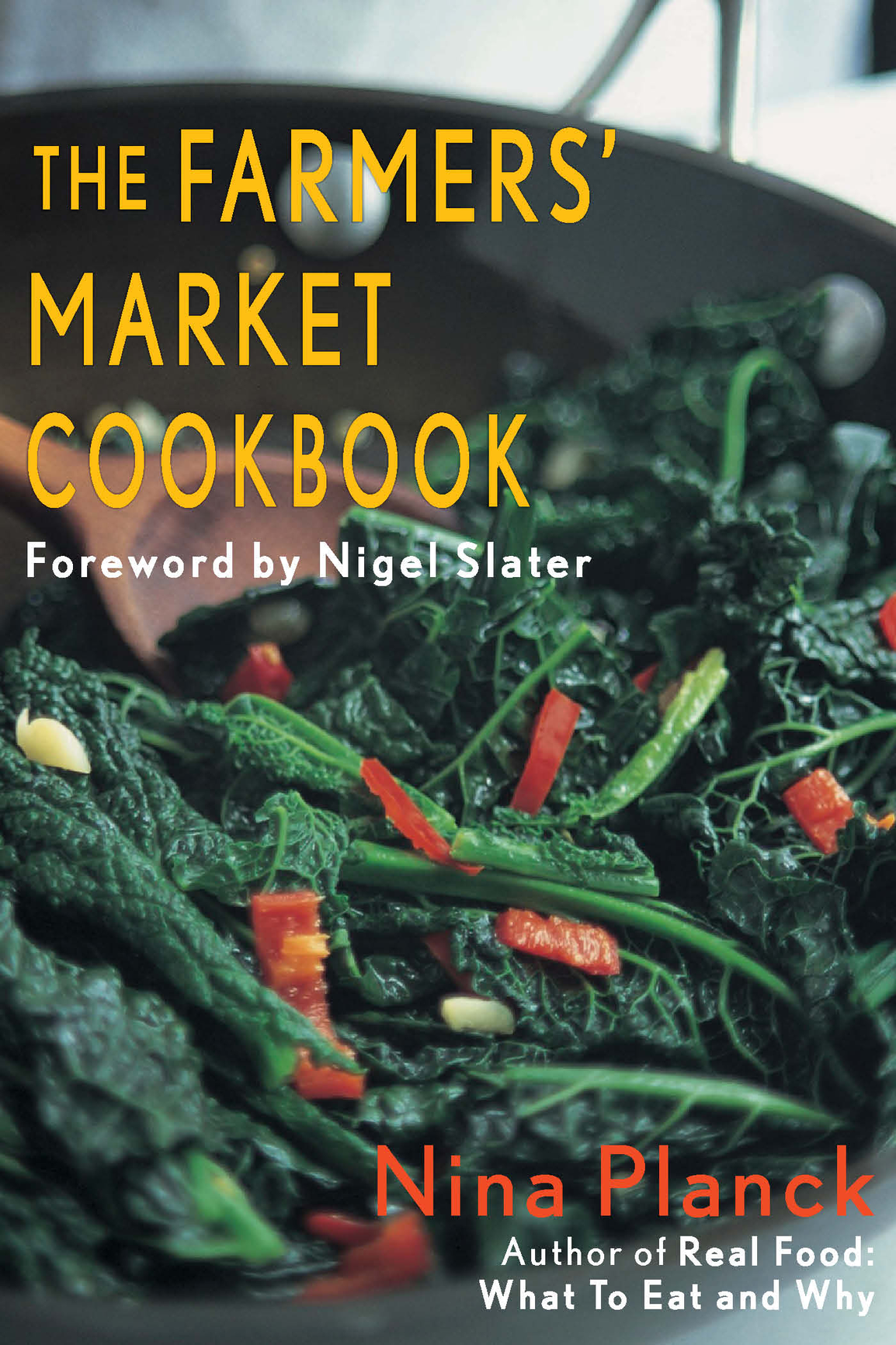

Diversion Books
A Division of Diversion Publishing Corp.
443 Park Avenue South, Suite 1004
New York, New York 10016
www.DiversionBooks.com
Copyright 2012 by Nina Planck
All rights reserved, including the right to reproduce this book or portions thereof in any form whatsoever.
For more information, email .
First Diversion Books edition May 2013.
ISBN: 978-1-938120-70-1 (ebook)
I like to know what Im putting in my mouth. But modern food shopping is a minefield. We have learned the hard way to mistrust factory farming and agribusiness. Food additives confuse us. We are suspicious of the motives of supermarkets. The natural seasons of fruit and vegetables are blurred. Our food is anonymous, its provenance distant, its background mysterious.
Who knew, until the mad cow disease disaster unfolded, that farmers were feeding sheep brains to cattle, turning a natural herbivore into a carnivore? Did anyone tell us that most lettuce has been sprayed a dozen times? Or that the flood of cheap imported plums has nearly wiped out our own orchards, along with countless traditional varieties?
If you are curious about such things, greengrocers and supermarket managers are little help. Most havent a clue what variety of peas or carrots they are selling. Potatoes are Jerseys, Cyprus, or Baking. Plums are Spanish, Victoria, or South African. They cant say whether the strawberries were grown outdoors or in poly-tunnels, or what they were sprayed with. They know the green beans are from Zimbabwe it says so on the box but little else.
There is a better way to shop. A way that restores not only character but flavor to the food. A way that is a pleasure, rather than a chore. My first trip to a farmers market was a revelation. The farmer described his apple varieties when he had picked them, which were at their peak, why I couldnt buy the ones I wanted (they would have a richer flavor if left on the tree a bit longer). Best of all, I sampled all the varieties with a pen knife.
So I was glad when Nina chose my neighbourhood for her farmers market. When the bell rings at 10 oclock (okay, so Im not often there at the bell), I can buy baby greens only hours old, fresh Cromer crab, wild damsons, unfiltered honey, grass-fed lamb, organic eggs. There are strawberries on the plant and Brussels sprouts on the stalk. The food is fresh, seasonal, and locally grown. I can ask all the questions I want. What better way to know what I am putting in my mouth?
Nigel Slater
London, August 2000
When I tell people that I created the first farmers market in London, England, in 1999, they look surprised. Surely such a thing existed in Roman Londinium? Well, yes, certainly there, and in more recent times farmers near whats now Heathrow Airport brought produce to very old trading places such as the famous Covent Garden.
But in modern Londonno. There were street markets, and organic markets, and small but growing organic sections in supermarkets. There were lots of radical Green types and there were terrible, European-wide food scandals (BSE, dioxin in chickens), but the first American-style producers-only farmers market in the capital (though not in England) was mine.
Its fair to say that the markets were an overnight sensation. Immediately the phone rang with farmers wanting markets and neighborhoods offering spaces. According to The New Yorker, the British press dubbed me The American, which, if I understand British tone of voice even a tiny bit, I take to be a largely but not entirely friendly moniker.
Never mind the nickname. My little business was and is thoroughly English, entirely homegrown. We soon opened more weekly markets. They thrived and in the next two years markets opened all over England, Scotland, and Wales. Today there are more than five hundred markets in the U.K. and the tradition, now rediscovered, is thriving in cultural and financial terms.
From this adventure, born of my own longing for the markets of my youth, came The Farmers Market Cookbook. In a year of cooking, I borrowed or created, and then cooked and devoured, recipes for all the foods our markets proffered from earth, sea, and sky, whether farmed, hunted, or foraged.
Quite by accident this little book converted me fatefully from an unhealthy and fat-phobic vegetarian who dabbled in fish, to a permanent and enthusiastic omnivore. My gateway food, it turned out, was roast chicken, and the particular gate, chicken skin and The Parsons Nose, as the Brits sometimes call it: that fatty, stubby little tail. Ecstasy it was to discover that the fats I feared were, in fact, my salvation. As I ventured, at first gingerly, and then in the style of a charging rhinoceros, into beef, pork, butter, and cheese, I lost weight and cheered up immensely. Honest friends will tell you that I also became a better cook. Better ingredients will do that.
The recipes are just as I wrote them in 1999. I havent changed a thing in this edition, but my own cooking has certainly evolved. I use more butter and more bone broths, braise more meats. I cook and eat more meat in general. Also, American readers may wonder how big a knob of butter is. Its a tablespoon or two; exactly how much is up to you. In the first edition, I recommended using an everyday olive oil for frying and your very best oil for dressing a salad; today I use the best extra-virgin, cold-pressed olive oil for every purpose and every dish. In the fruit and vegetable profiles, Ive mentioned many varieties I discovered in England. You might not see them at your local markets, but Ive left the names as tehy are, a snap shot of my London markets in 1999.
My faith in the superior flavor of local produce harvested at its peak and sold in its prime remains. My faith in the farmers ability to lead us to good food, a belief instilled by my own childhood at Wheatland Vegetable Farms, and rekindled by all the farmers who attend our London marketsand by good farmers everywhereis as strong as a taproot.
N ina Planck
New York City
2013
What was paradise, but a garden full of vegetables and herbs and pleasure? Nothing there but delights.
William Lawson, 17th century
I grew up on a 60-acre farm in Wheatland, Virginia. The first summer we farmed, we sold our fruit and vegetables by the side of the road in nearby small towns. We didnt sell much. The following summer, the first farmers markets opened in Greater Washington, D.C., about an hours drive away. The first time we went to market, in 1980, we picked beets and Swiss chard at six a.m. and turned up an hour late.
We were amazed. It was as if the customers had waited all their lives to buy fresh produce in a parking lot on Saturday morning. Word spread, and the markets grew. Now my parents sell at fifteen farmers markets a week in peak season. You have to go where the people are.
We could not have made a living farming without farmers markets. But there is more to markets than money. It is deeply gratifying to sell food you have grown to people who appreciate it. The customers delight makes all the hoeing, mulching, and picking worthwhile. Going to market with a truck full of produce and coming home with empty baskets is fun, too.
Font size:
Interval:
Bookmark:
Similar books «The Farmers Market Cookbook»
Look at similar books to The Farmers Market Cookbook. We have selected literature similar in name and meaning in the hope of providing readers with more options to find new, interesting, not yet read works.
Discussion, reviews of the book The Farmers Market Cookbook and just readers' own opinions. Leave your comments, write what you think about the work, its meaning or the main characters. Specify what exactly you liked and what you didn't like, and why you think so.

